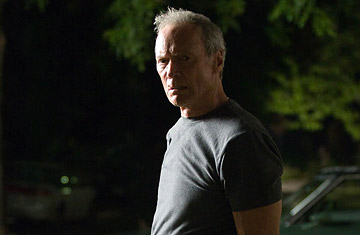
Settling a score with himself, Clint Eastwood in Gran Torino.
Walt Kowalski is, to put it gently, an old crank, given to growling and spitting like a distempered stray. He's a mass of gruff prejudices against the minorities who've moved into his Michigan town. When some kids brawl in front of his house, he brandishes a rifle and actually shouts, "Get off my lawn!" In any other movie, he'd be the sour comic relief or the monster's first victim. But since, in Gran Torino, he's played by Clint Eastwood, Walt is a stalwart man of the Midwest--the hero who has a score to settle. With himself.
Well into his fifth decade as one of the world's most popular and honored movie stars, Eastwood has lately sloughed off acting to concentrate on directing; Gran Torino is the ninth feature (including the documentary Piano Blues) that he's helmed since turning 70 in 2000. He doesn't do much work in front of the camera anymore, but what's there is choice. His last starring role, as the grizzled fight trainer in 2004's Million Dollar Baby, earned him an Academy Award nomination for Best Actor, while the movie won for picture, actress (Hilary Swank), supporting actor (Morgan Freeman) and, of course, director. Nobody else has directed Eastwood in a movie since Wolfgang Petersen made In the Line of Fire back in '93. (See the 100 best movies of all time.)
That makes an Eastwood lead role a movie event--especially since he's hinted he would stick to directing from now on. About Gran Torino, he recently said, "That will probably do it for me as far as acting is concerned." (We hope not. At 78, he still looks great.) He might have been kidding, but you'll want to catch the film in case it really is the Lone Thespian taking his last ride into the sunset.
The Star with No Peer
He's done all right for a fellow who began as a Universal contract player in 1955, doing bit roles in movies starring giant spiders (Tarantula) and talking mules (Francis in the Navy). He settled into the saddle as ramrod Rowdy Yates, second lead in the cattle-drive TV western Rawhide, a job that guaranteed a paycheck but deferred movie fame. Sergio Leone changed all that when he paid Eastwood $15,000 to play a misanthrope with a gun, wiping out two teams of bad guys, in Fistful of Dollars. By the time he'd done two more Leone westerns, For a Few Dollars More and The Good, the Bad and the Ugly, Eastwood was a star in the classic Hollywood sense--which is to say he had found a persona that he could comfortably inhabit and that would attract customers in the U.S. and abroad, where they call him "Cleent."
That persona basically took John Wayne, the solitary western hero, and made him nastier, edgier, way easier to anger. Where the Duke drawled and lumbered--he wasn't so much a cattleman as a cattle man--Clint scowled and pounced, a scorpion with stubble. This character was both iconic and malleable: he was as at home on the streets as on the range and as a cop (in the Dirty Harry series), a convict (Escape from Alcatraz), a soldier (Heartbreak Ridge) and, later, a father figure like the Old Testament God--anyone with an intimidating presence and a sandpaper soul. Is that acting? Sure. He doesn't just behave; he performs, confidently, richly, within the slim range of the Man with No Name, no home and no regrets. How do we know this is acting? Because in person Eastwood is genial, soft-spoken, quick-smiling--the opposite of the movie Clint in temperament and thoughtfulness, his equal only in stature.
Another similarity: the self-assurance of the Clint character, an almost religious trust in first impulses, is reflected in Eastwood's method as a film director. Others take years to nurse a project; Eastwood revved up Gran Torino in June, started shooting in mid-July and had his final cut by the end of October. This cool efficiency endears him to screenwriters (if he likes a script, he shoots it without demanding a million rewrites) and most actors (if he likes Take 1, he prints it and goes to the next scene). Hey, it's only a movie. And often--say, Breezy, Pale Rider, Unforgiven, Million Dollar Baby, Flags of Our Fathers, to skim five off the top--they are movies that have the craft and heart of classic Hollywood, without that musty antique odor.
